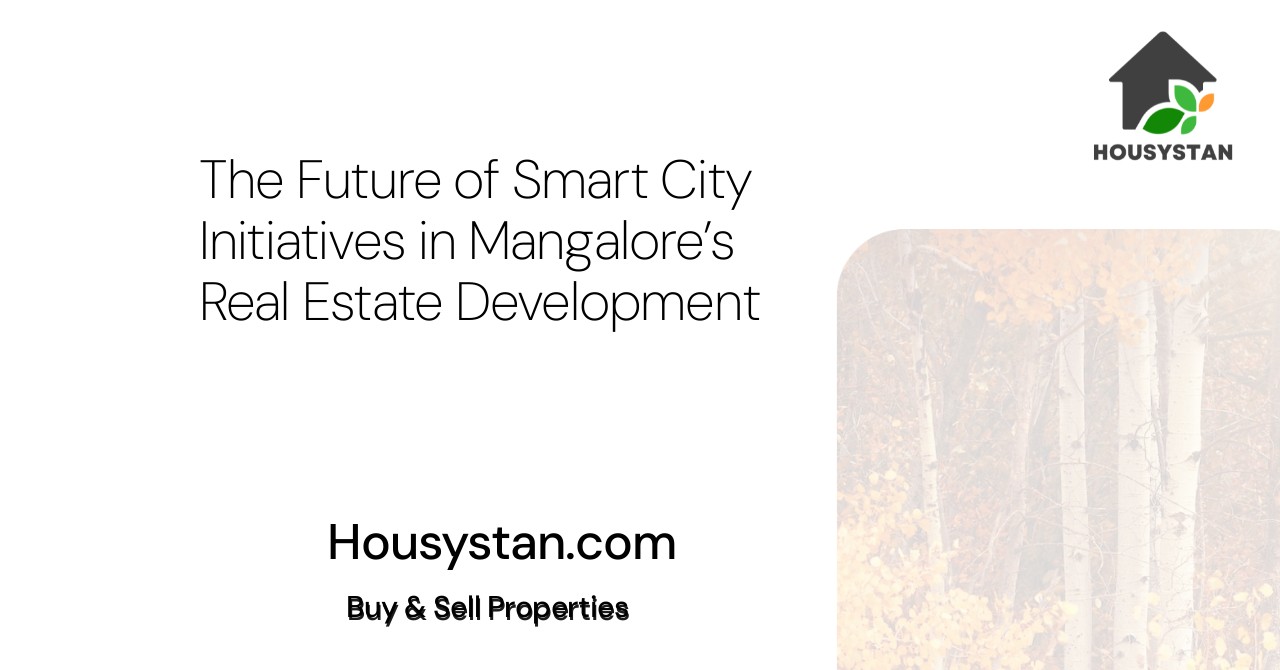The Future of Smart City Initiatives in Mangalore’s Real Estate Development
Read latest blogs and articles from Housystan

The Information mentioned here was last updated on:
21/2/2026The Future of Smart City Initiatives in Mangalore’s Real Estate Development
Introduction: Mangalore’s Transformation through Smart City Initiatives
Mangalore, a vibrant coastal city in Karnataka, is undergoing a remarkable transformation driven by smart city initiatives. As India advances towards urban modernization, Mangalore stands at the forefront of sustainable development, integrating technology and innovation to redefine its real estate landscape. These efforts are not only enhancing the city’s infrastructure but also fostering a new era of urban living, making Mangalore an attractive destination for residents, investors, and businesses alike.
- Verified Tenants/Buyers
- Unlimited Property Listing
- Zero subscription/charges fee
The Concept of Smart Cities: A New Urban Vision
Smart cities represent a holistic approach to urban planning, emphasizing the use of digital technology, data analytics, and sustainable practices. The goal is to create environments that are efficient, inclusive, and resilient. In Mangalore, the smart city initiative is centered around improving civic amenities, optimizing resources, and enhancing the quality of life through advanced technological solutions. These projects are designed to address challenges such as traffic congestion, waste management, energy consumption, and public safety.
Key Drivers of Smart City Development in Mangalore
Several factors are propelling Mangalore’s journey towards becoming a smart city:
1. Robust Infrastructure Upgrades
The city is witnessing substantial investment in developing world-class infrastructure. Road expansions, smart traffic management systems, and upgraded public transportation are reducing travel time and improving connectivity. Modern drainage and water supply systems are being implemented to ensure efficient resource management, addressing the pressing needs of a growing urban population.
2. Digital Integration and E-Governance
Digital platforms are streamlining municipal services, making them more accessible and transparent. Residents can now access information, pay bills, and register complaints online. E-governance is fostering greater civic engagement and accountability, which is crucial for sustainable urban development.
3. Sustainable and Green Initiatives
Mangalore’s smart city mission prioritizes environmental sustainability. Green building codes, renewable energy adoption, and smart waste management systems are being implemented across the city. These measures not only reduce the carbon footprint but also create healthier living environments, attracting eco-conscious homebuyers and investors.
The Impact on Real Estate Development
Smart city initiatives are reshaping Mangalore’s real estate sector in several significant ways:
1. Rise in Mixed-Use Developments
There is a growing trend towards mixed-use developments, where residential, commercial, and recreational spaces are integrated into single complexes. These projects offer convenience, reduce commute times, and promote a vibrant community lifestyle. Real estate developers are increasingly focusing on such models to cater to the evolving preferences of urban dwellers.
2. Demand for Smart Homes and Digital Infrastructure
With the proliferation of high-speed internet and IoT-enabled devices, homebuyers are seeking properties equipped with smart features. Automated lighting, security systems, and energy-efficient appliances are becoming standard offerings in new developments, signaling a shift towards digital-first living environments.
3. Enhanced Property Value and Investment Appeal
The infusion of smart infrastructure is driving up property values in Mangalore. Areas with improved connectivity, access to amenities, and sustainable features are witnessing higher demand and appreciation rates. This is attracting both domestic and international investors, making the city a hotbed for real estate growth.
Challenges in Implementing Smart City Projects
While the prospects are promising, the journey towards a fully smart Mangalore is not without challenges. Urban planners face hurdles related to funding, land acquisition, and integrating legacy systems with new technologies. Additionally, ensuring that smart solutions are inclusive and accessible to all sections of society is critical for the success of these initiatives.
Public-Private Partnerships: A Catalyst for Progress
Collaboration between government agencies and private players is proving instrumental in overcoming these challenges. Public-private partnerships (PPP) are facilitating faster project execution, bringing in technical expertise, and optimizing resource utilization. Such partnerships are also ensuring that smart city projects remain financially viable and aligned with global best practices.
Focus on Sustainability and Resilience
A key aspect of Mangalore’s smart city mission is resilience against climate change and natural disasters. The integration of green spaces, rainwater harvesting systems, and energy-efficient buildings is making the city more adaptable to environmental challenges. Urban planners are adopting a forward-thinking approach, focusing on long-term sustainability while addressing current needs.
Community Engagement and Inclusive Growth
Smart city development in Mangalore emphasizes community participation. Regular stakeholder consultations, feedback mechanisms, and citizen-centric initiatives are ensuring that the transformation is inclusive. The involvement of local residents in planning and decision-making processes is fostering a sense of ownership and accountability, which is vital for the success of any urban initiative.
The Road Ahead: Opportunities and Expectations
Mangalore’s smart city initiatives are poised to unlock a spectrum of opportunities for real estate developers, investors, and residents. As the city continues to modernize, the demand for innovative real estate solutions will only intensify. Developers who embrace sustainability, digital integration, and community-centric planning will be well-positioned to thrive in this evolving landscape.
Moreover, as global trends shift towards smart urban living, Mangalore’s early adoption of these initiatives will enhance its competitiveness on the national and international stage. The city has the potential to emerge as a model for other urban centers in India, showcasing the benefits of technology-driven growth and sustainable development.
Conclusion: Mangalore’s Vision for a Smart Future
The future of smart city initiatives in Mangalore’s real estate development is bright and promising. By leveraging technology, fostering public-private collaboration, and prioritizing sustainability, the city is laying the foundation for a smarter, greener, and more inclusive urban environment. As these initiatives gather momentum, Mangalore is set to redefine urban living, offering a blueprint for cities across India and beyond. For investors, developers, and residents, the time is ripe to be part of Mangalore’s exciting journey towards a smarter future.